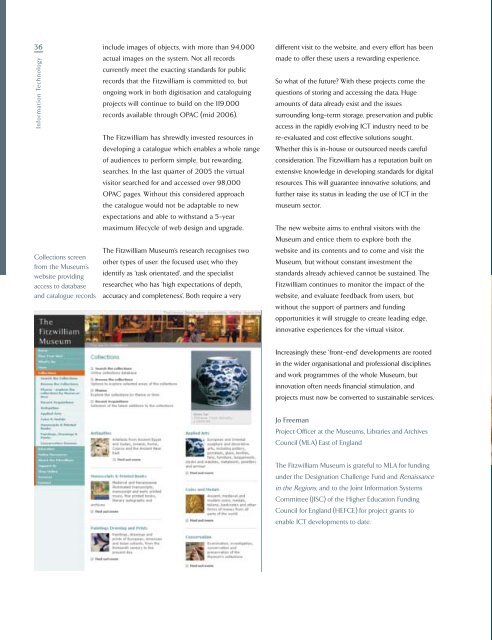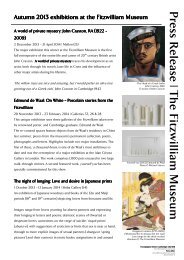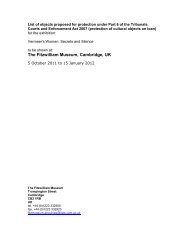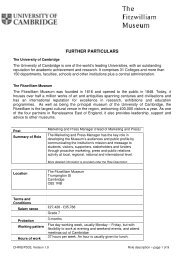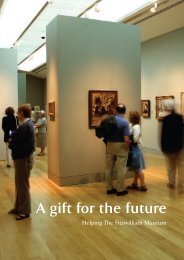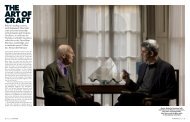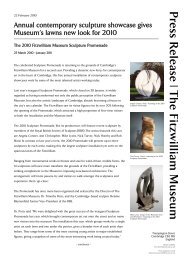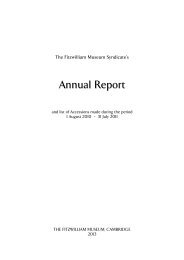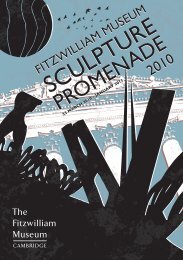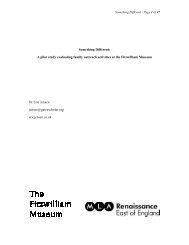The Fitzwilliam Museum - University of Cambridge
The Fitzwilliam Museum - University of Cambridge
The Fitzwilliam Museum - University of Cambridge
You also want an ePaper? Increase the reach of your titles
YUMPU automatically turns print PDFs into web optimized ePapers that Google loves.
36 include images <strong>of</strong> objects, with more than 94,000<br />
actual images on the system. Not all records<br />
currently meet the exacting standards for public<br />
records that the <strong>Fitzwilliam</strong> is committed to, but<br />
ongoing work in both digitisation and cataloguing<br />
projects will continue to build on the 119,000<br />
records available through OPAC (mid 2006).<br />
Information Technology<br />
Collections screen<br />
from the <strong>Museum</strong>’s<br />
website providing<br />
access to database<br />
and catalogue records<br />
<strong>The</strong> <strong>Fitzwilliam</strong> has shrewdly invested resources in<br />
developing a catalogue which enables a whole range<br />
<strong>of</strong> audiences to perform simple, but rewarding,<br />
searches. In the last quarter <strong>of</strong> 2005 the virtual<br />
visitor searched for and accessed over 98,000<br />
OPAC pages. Without this considered approach<br />
the catalogue would not be adaptable to new<br />
expectations and able to withstand a 5-year<br />
maximum lifecycle <strong>of</strong> web design and upgrade.<br />
<strong>The</strong> <strong>Fitzwilliam</strong> <strong>Museum</strong>’s research recognises two<br />
other types <strong>of</strong> user: the focused user, who they<br />
identify as ‘task orientated’, and the specialist<br />
researcher, who has ‘high expectations <strong>of</strong> depth,<br />
accuracy and completeness’. Both require a very<br />
different visit to the website, and every effort has been<br />
made to <strong>of</strong>fer these users a rewarding experience.<br />
So what <strong>of</strong> the future? With these projects come the<br />
questions <strong>of</strong> storing and accessing the data. Huge<br />
amounts <strong>of</strong> data already exist and the issues<br />
surrounding long-term storage, preservation and public<br />
access in the rapidly evolving ICT industry need to be<br />
re-evaluated and cost effective solutions sought.<br />
Whether this is in-house or outsourced needs careful<br />
consideration. <strong>The</strong> <strong>Fitzwilliam</strong> has a reputation built on<br />
extensive knowledge in developing standards for digital<br />
resources. This will guarantee innovative solutions, and<br />
further raise its status in leading the use <strong>of</strong> ICT in the<br />
museum sector.<br />
<strong>The</strong> new website aims to enthral visitors with the<br />
<strong>Museum</strong> and entice them to explore both the<br />
website and its contents and to come and visit the<br />
<strong>Museum</strong>, but without constant investment the<br />
standards already achieved cannot be sustained. <strong>The</strong><br />
<strong>Fitzwilliam</strong> continues to monitor the impact <strong>of</strong> the<br />
website, and evaluate feedback from users, but<br />
without the support <strong>of</strong> partners and funding<br />
opportunities it will struggle to create leading edge,<br />
innovative experiences for the virtual visitor.<br />
Increasingly these ‘front-end’ developments are rooted<br />
in the wider organisational and pr<strong>of</strong>essional disciplines<br />
and work programmes <strong>of</strong> the whole <strong>Museum</strong>, but<br />
innovation <strong>of</strong>ten needs financial stimulation, and<br />
projects must now be converted to sustainable services.<br />
Jo Freeman<br />
Project Officer at the <strong>Museum</strong>s, Libraries and Archives<br />
Council (MLA) East <strong>of</strong> England<br />
<strong>The</strong> <strong>Fitzwilliam</strong> <strong>Museum</strong> is grateful to MLA for funding<br />
under the Designation Challenge Fund and Renaissance<br />
in the Regions, and to the Joint Information Systems<br />
Committee (JISC) <strong>of</strong> the Higher Education Funding<br />
Council for England (HEFCE) for project grants to<br />
enable ICT developments to date.


